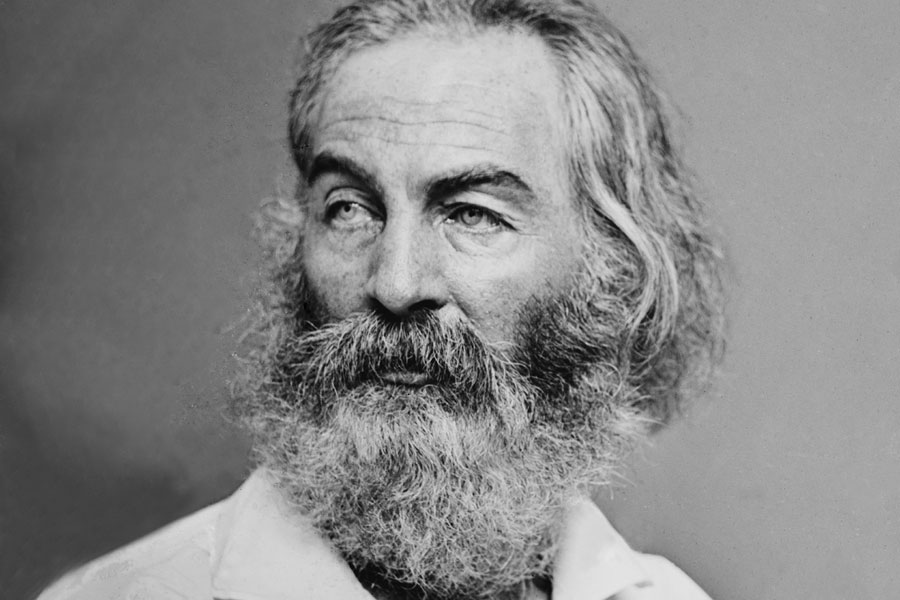Walt Whitman

Walt Whitman, one of America’s most influential poets, is intimately tied to the story and spirit of Long Island. Celebrated as the “Bard of Democracy,” Whitman drew inspiration from the island’s landscapes, people, and rhythms, weaving them into poems that forever changed American literature. His life and legacy still echo across Long Island, from his birthplace in Huntington to museums, landmarks, and ongoing literary celebrations.
Birthplace, Early Life, and Inspiration
Walt Whitman was born in 1819 in a modest farmhouse in West Hills, near Huntington, Long Island:
- Growing up amid Long Island’s farms, woodlands, and shores, Whitman’s childhood experiences deeply influenced his sense of individuality and his appreciation for nature and community.
- Many local scenes, from the sounds of the surf at Fire Island to the bustle of Brooklyn ferry docks, later became vivid imagery in his poetry.
“Leaves of Grass” and the Long Island Muse
Whitman’s revolutionary poetry collection, Leaves of Grass, reflects his lifelong love for Long Island:
- He began crafting poetry while working as a teacher and journalist in the region, with the first edition of Leaves of Grass published in Brooklyn in 1855.
- Poems such as Paumanok, Whitman’s native name for Long Island, and Starting from Paumanok celebrate the island’s influence on his vision for America.
Community, Journalism, and Advocacy
Long Island was not just a source of beauty for Whitman – it also shaped his views on democracy, equality, and the American experience:
- As a teacher in Southold, Smithtown, and Babylon, Whitman valued education and community engagement.
- He edited the Brooklyn Eagle, writing articles and editorials that reflected his progressive values and advocacy for social justice, freedom, and the “common man.”
Whitman’s Enduring Long Island Legacy
Walt Whitman’s legacy on Long Island is preserved and honored in numerous ways:
- The Walt Whitman Birthplace State Historic Site in Huntington welcomes visitors to explore the home where he was born and discover exhibits on his life and work.
- Annual poetry readings, educational programs, and art installations ensure that new generations encounter Whitman’s creative genius and democratic ideals.
- Local landmarks – including schools, parks, and roads – bear his name, commemorating his devotion to the region and to American arts.
Visiting Walt Whitman’s Long Island
Today, you can trace Whitman’s Long Island journey through a variety of engaging sites and experiences:
- Whitman Birthplace: Tour the preserved farmhouse in West Hills, featuring memorabilia, manuscripts, and interactive exhibits.
- Poetry Trails: Follow literary walking tours that spotlight key sites from Whitman’s youth and career.
- Whitman-inspired Events: Attend annual festivals, poetry slams, and community readings that celebrate his enduring influence.
- Educational Programs: Join workshops and lectures at the birthplace museum and local libraries to deepen your appreciation of his poetry and philosophy.
Walt Whitman’s presence is alive in the spirit of Long Island, a testament to the ways in which local heritage can shape a literary legacy that belongs to the world. Whether you’re a poetry lover, a student, or simply someone seeking inspiration, Whitman’s story invites you to experience the beauty, creativity, and energy of Long Island in a new light.
Walt Whitman Quick Info
| Fact | Details |
|---|---|
| Birth/Death | 1819, West Hills, (Huntington) NY – 1892, Camden, NJ |
| Long Island Legacy | Birthplace, teaching, early writing, lifelong inspiration |
| Key Works | Leaves of Grass, Song of Myself, Starting from Paumanok |
| Famous Site | Walt Whitman Birthplace State Historic Site, Huntington |
| Notable Accomplishments | Revolutionized American poetry, Advocate for democracy & equality |
| Famous Quote | “I celebrate myself, and sing myself…” |
| Fun Fact | “Paumanok” is the indigenous name for Long Island, often used by Whitman |
| Community Honors | Whitman schools, parks, roads, poetry festivals, literary trails |
Walt Whitman’s impact on Long Island and the world of poetry is a living tradition. Through his words and the places that shaped him, locals and visitors alike can journey into an extraordinary legacy – a uniquely American voice rooted in Long Island soil.

